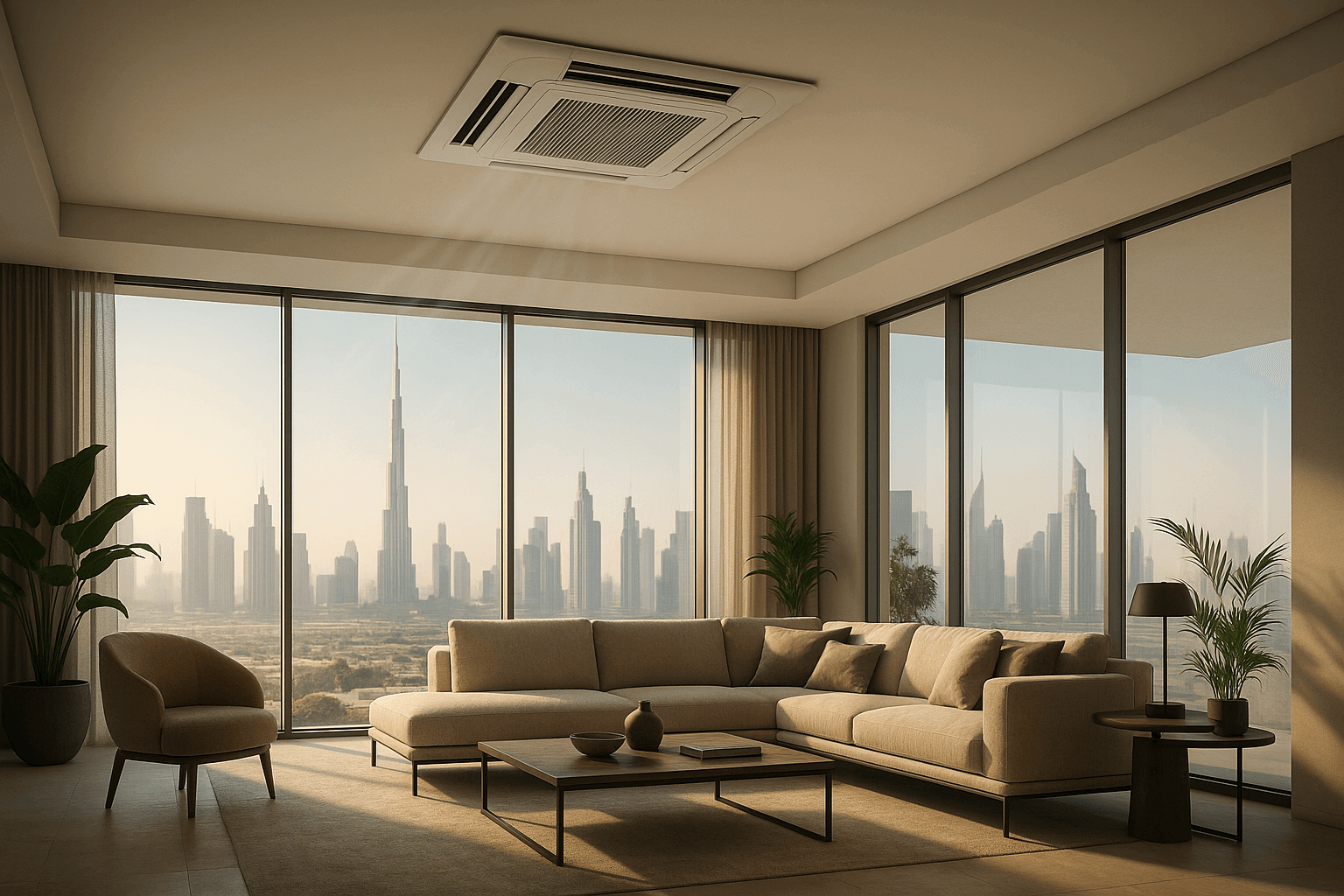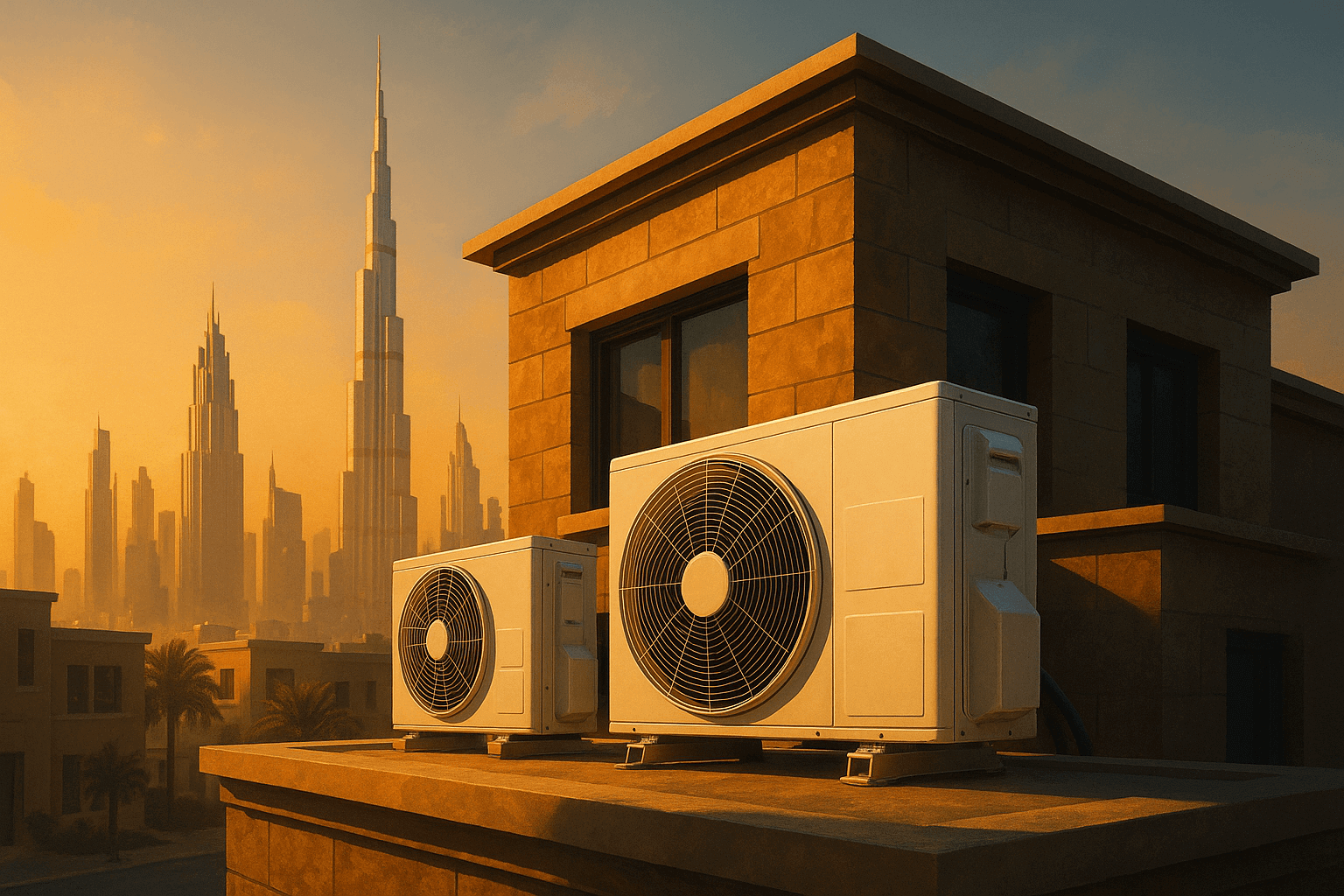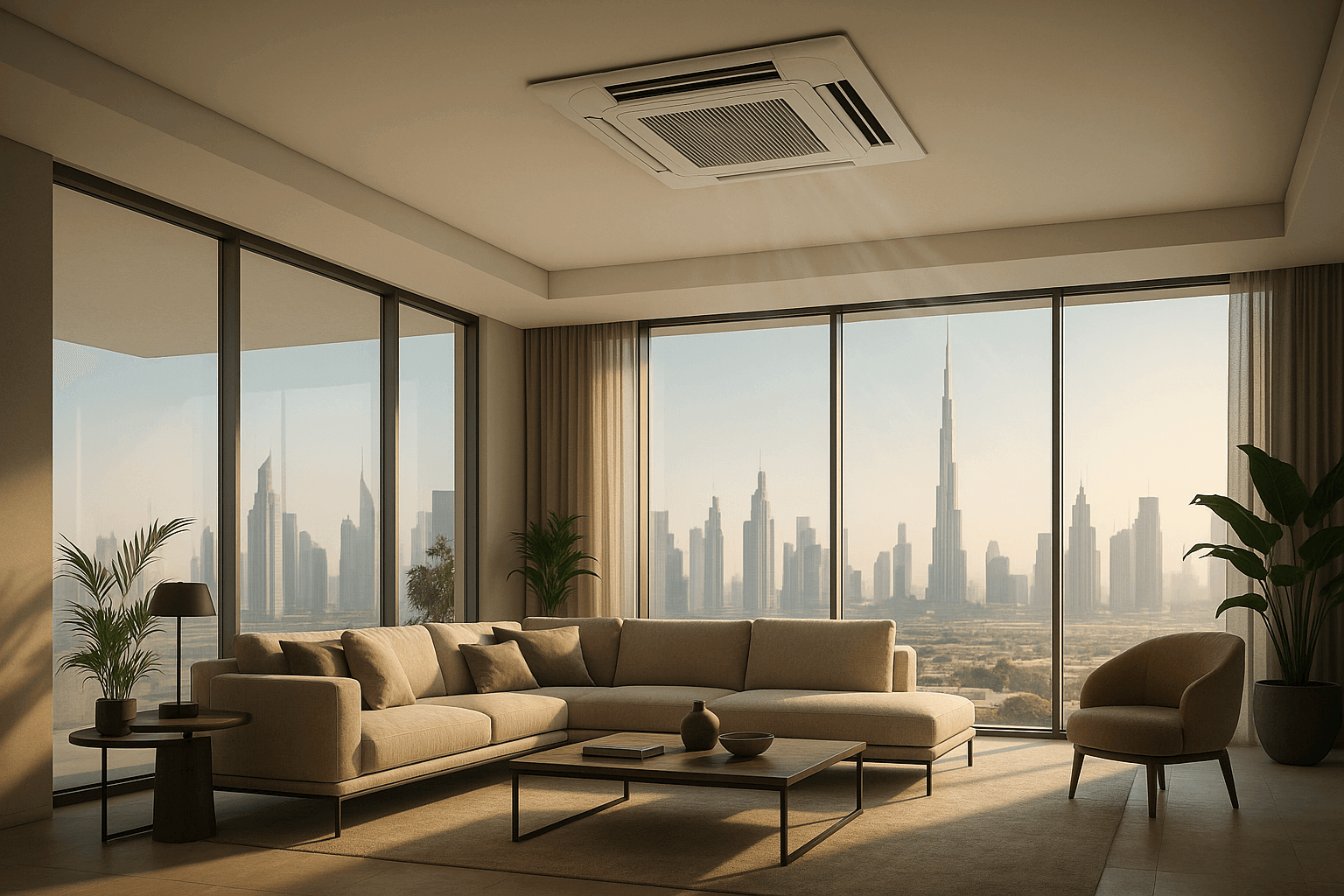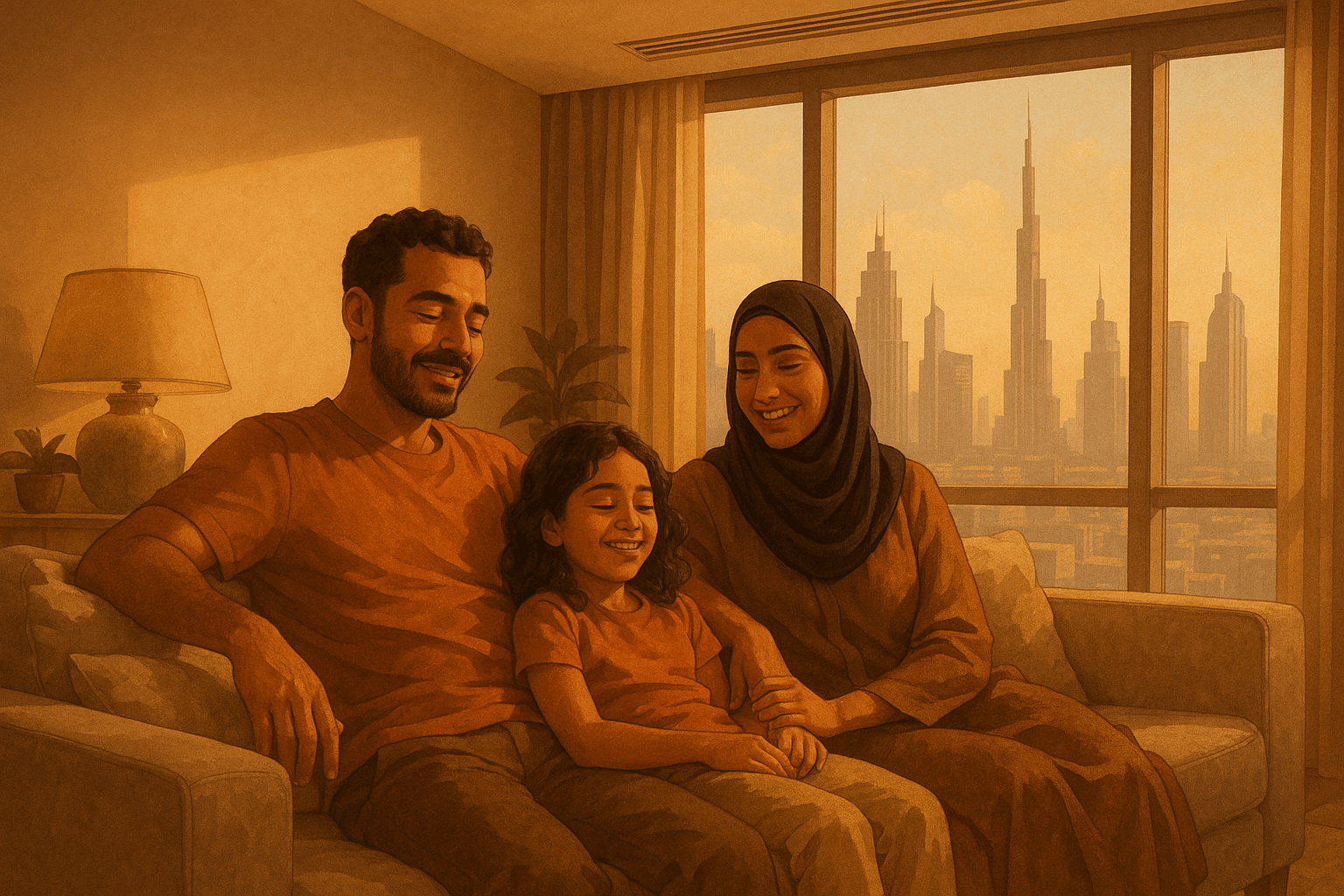Split AC vs Central AC: Which is Right for Your Dubai Home?

Here's the decision that keeps Dubai homeowners awake at night: you're facing an AC system replacement, contractors are pushing different solutions, and everyone seems to have strong opinions about what works best.
The truth is, in Dubai's extreme climate, both split and central systems can work brilliantly - or fail miserably - depending on whether they're properly matched to your home and lifestyle.
Unlike moderate climates where system choice is largely about preferences, Dubai's demanding environment makes this decision critical for comfort, efficiency, and long-term costs. The wrong choice doesn't just mean discomfort - it means thousands of dirhams in wasted electricity, frequent repairs, and potential system replacement years earlier than necessary.
We've seen families struggle with oversized central systems that waste energy in partially occupied homes, and others frustrated by multiple split units that never achieve consistent whole-home comfort.
The smart approach involves understanding how each system type handles Dubai's specific challenges and matching that to your family's actual needs rather than generic recommendations.
Understanding Dubai's System Requirements
Before diving into system comparisons, it's crucial to understand what makes AC selection in Dubai fundamentally different from other locations. Our climate creates demands that push both split and central systems beyond their typical operating parameters.
Extreme temperature differentials mean your AC system fights 20-25°C differences between indoor and outdoor temperatures for months at a time. Most AC systems worldwide handle 10-15°C differentials occasionally, whilst Dubai systems maintain extreme differentials constantly. This affects everything from energy consumption to component wear rates.
Year-round operation eliminates the rest periods that extend system life in seasonal climates. Your AC components experience wear equivalent to 2-3 years of normal operation annually, making reliability and serviceability critical factors beyond initial cost considerations.
Dust infiltration affects all AC systems but impacts different designs differently. Split systems offer individual unit protection but require multiple filter maintenance points. Central systems provide single-point filtration but risk contaminating entire home air supplies when filters fail.
Humidity management becomes critical during Dubai's humid summer months. Poor humidity control breeds mould, creates comfort problems, and damages home contents. Different system types handle humidity removal with varying effectiveness.
Electrical demands in Dubai require robust electrical infrastructure. Multiple split systems need individual electrical circuits, whilst central systems concentrate electrical loads. Both approaches create electrical planning requirements that affect installation costs and home electrical capacity.
Emma-lou from Arabian Ranches learned these factors matter: "We initially wanted central AC for our villa because it seemed more elegant. HomeIQ explained that our electrical panel couldn't handle a large central system without expensive upgrades, whilst split systems could use existing circuits. Understanding Dubai's specific requirements completely changed our decision-making process."
Note: DEWA (Dubai Electricity & Water Authority) highlights that AC systems have an optimal lifetime of around 10 years. Beyond that, efficiency drops significantly, so lifetime should be factored into the decision

Split Systems: Dubai's Flexible Favourite
Split systems dominate Dubai's residential market for good reasons - they offer flexibility, individual control, and redundancy that suits both our climate and lifestyle patterns. However, their success depends entirely on proper sizing, placement, and maintenance.
Individual room control provides the flexibility that Dubai families need. Different family members tolerate heat differently, children's rooms need different cooling schedules than adult spaces, and guest rooms don't require constant cooling when unoccupied. Split systems allow customised comfort that central systems struggle to match.
System redundancy means complete cooling loss becomes unlikely. When one split unit fails, other areas remain comfortable whilst you arrange repairs. This redundancy proves invaluable during Dubai's peak summer months when emergency repairs cost premium rates and take longer to schedule.
Staged installation allows budget spreading and phased home cooling improvement. Many families start with bedroom cooling and add living areas over time. This approach works particularly well for expat families who might relocate before completing full home installations.
Maintenance accessibility simplifies service and reduces costs. Individual units require less complex maintenance, parts replacement affects only single zones, and maintenance scheduling becomes more flexible when multiple contractors can work simultaneously on different units.
Energy efficiency through individual operation means you cool only occupied spaces. Dubai's electricity costs make this efficiency crucial - running four split units in a large villa often costs less than cooling the entire home with central AC when family areas concentrate in specific zones.
Installation flexibility accommodates various home configurations without major modifications. Split systems work in apartments, villas, extensions, and renovated spaces where central ductwork would be impractical or expensive to install.

Central AC: Whole-Home Comfort Solutions
Central systems excel in larger Dubai homes where consistent whole-home comfort, superior air quality, and aesthetic considerations justify the increased complexity and cost. However, central systems require proper design and maintenance to succeed in our climate.
Consistent whole-home comfort represents central AC's primary advantage. Large villas achieve uniform temperatures throughout all spaces, eliminating hot spots and temperature variations between rooms. This consistency becomes particularly valuable in open-plan layouts popular in Dubai architecture.
Superior air filtration provides better indoor air quality than individual split units. Central systems can incorporate HEPA filtration, UV sterilisation, and advanced air purification that dramatically improve air quality in Dubai's dusty environment. This advantage becomes significant for families with allergies or respiratory sensitivities.
Aesthetic integration appeals to homeowners who prefer clean interior design without visible AC units. Central systems hide most equipment whilst providing discrete air distribution through ceiling vents. This clean appearance suits luxury homes where visible AC units detract from interior design.
Zoning capabilities in modern central systems provide some individual room control whilst maintaining whole-home efficiency. Multi-zone central systems can cool different areas to different temperatures whilst sharing the efficiency advantages of central equipment.
Humidity control through central systems often exceeds split system capabilities. Larger central units incorporate better humidity removal, whilst central air distribution prevents humidity pockets that individual units sometimes create.
Maintenance consolidation means single system service instead of multiple unit maintenance. When properly maintained, central systems require less frequent service calls and can be more cost-effective for maintenance than multiple split units.
Noise reduction through central systems locates noisy equipment away from living spaces. Large outdoor units position away from bedrooms and entertainment areas, whilst indoor air handlers install in utility areas rather than living spaces.
Cost Analysis: Beyond Installation Pricing
Understanding total ownership costs requires looking beyond installation pricing to include energy consumption, maintenance expenses, and long-term replacement costs. Dubai's climate significantly affects these ongoing expenses.
Installation cost comparison shows central systems typically costing 50-80% more than equivalent split system installations. A villa requiring AED 25,000 in split systems might need AED 40,000-45,000 for comparable central AC. However, this comparison requires careful analysis of what "comparable" means in each case.
Energy efficiency varies dramatically based on usage patterns and system design. Split systems operated selectively (cooling only occupied areas) often consume 20-30% less energy than central systems cooling entire homes. However, central systems with proper zoning can match split system efficiency whilst providing superior comfort.
Maintenance cost structures differ significantly between systems. Split systems require multiple service calls and more frequent filter changes, but individual unit repairs cost less than central system component failures. Central systems need less frequent service but command higher per-visit charges for specialised maintenance.
Replacement timeline considerations affect long-term cost analysis. Split systems allow staged replacement as individual units fail, spreading replacement costs over time. Central systems require complete replacement simultaneously, creating larger financial impacts but also opportunities for efficiency upgrades.
Electricity consumption patterns in Dubai favour systems that match usage to demand. Families who spend time in specific areas benefit from split system efficiency, whilst those using entire homes consistently might find central systems more economical.
Property value impact tends to favour central systems in luxury properties whilst split systems suit most residential markets. Central AC often increases property values more significantly, particularly in villa communities where buyers expect whole-home cooling.

Performance in Dubai's Extreme Conditions
Dubai's climate tests AC systems beyond normal operating parameters, revealing performance differences that don't appear in moderate climates.
Understanding these differences helps predict long-term satisfaction with either system choice.
Extreme heat handling varies between system types. Large central units often handle extreme temperatures more efficiently than smaller split units, which can struggle during Dubai's hottest periods. However, oversized central units waste energy during moderate periods when split systems operate more efficiently.
Dust storm recovery affects systems differently. Split systems with individual filtration contain contamination to single units when filters fail, whilst central system filter failures contaminate entire home air supplies. However, central systems can incorporate better filtration that prevents contamination more effectively.
Humidity management during Dubai's humid months reveals system differences. Central systems with proper sizing provide superior humidity removal, whilst split systems sometimes struggle with humidity control in larger spaces or during periods of reduced cooling load.
Component stress from constant operation affects systems differently. Split systems distribute stress across multiple smaller components, whilst central systems concentrate stress on fewer, larger components. This affects both reliability patterns and repair costs.
Power surge protection becomes critical in Dubai's electrical environment. Multiple split systems create multiple failure points during power surges, whilst central systems concentrate electrical vulnerability but allow more comprehensive surge protection installation.
Noise considerations under constant operation matter more in Dubai than occasional-use climates. Central systems typically operate more quietly than multiple split units, particularly important for families working from home or spending extensive time indoors.

Lifestyle and Home Configuration Factors
Beyond technical considerations, your family's lifestyle patterns and home configuration significantly influence which system type provides better long-term satisfaction.
Family size and patterns affect system choice significantly. Large families using entire homes consistently benefit from central systems, whilst smaller families or those with variable occupancy patterns often prefer split system flexibility.
Home architecture influences system suitability. Open-plan layouts favour central systems that distribute air evenly, whilst compartmentalised homes work well with individual split units for each space.
Travel patterns common among Dubai expat families suit different systems differently. Frequent travellers appreciate split systems that allow cooling only essential areas during absences, whilst central systems provide better whole-home protection against humidity and mould during extended travel.
Entertainment patterns affect comfort requirements. Families who host regularly need consistent whole-home cooling that central systems provide more easily, whilst those with simpler entertaining needs might prefer split systems' individual control.
Work from home requirements have become more important post-pandemic. Home offices need reliable, individual temperature control that split systems provide excellently, whilst central systems offer better whole-home comfort for families with multiple home workers.
Future flexibility needs vary by family situation. Growing families or those planning home modifications might appreciate split systems' expansion flexibility, whilst established families might prefer central systems' comprehensive comfort.
Noise sensitivity affects daily comfort significantly. Central systems typically operate more quietly, important for light sleepers or homes with noise-sensitive activities like music practice or video recording.
Making the Right Choice for Your Situation
Successful system selection requires honest assessment of your specific situation rather than following generic recommendations or neighbours' choices. Consider multiple factors simultaneously rather than optimising for single concerns like upfront cost or aesthetic appeal.
Evaluate your home size and layout honestly. Homes under 2,500 square feet often work better with split systems, whilst larger homes benefit from central systems' efficiency and consistency. However, layout matters more than square footage - compartmentalised large homes might suit splits better than open smaller homes.
Assess your electrical infrastructure realistically. Central systems require significant electrical capacity that many Dubai homes lack, potentially adding AED 5,000-10,000 to installation costs. Split systems often work with existing electrical systems but require multiple circuits.
Consider your family's patterns objectively. Track which areas you actually use consistently versus occasionally. Families who use entire homes regularly benefit from central systems, whilst those concentrating in specific areas gain efficiency from splits.
Evaluate your maintenance preferences honestly. Some families prefer simplified central system maintenance, whilst others appreciate split systems' flexibility and lower individual repair costs.
Plan for future changes realistically. Consider potential family growth, home modifications, or relocation timelines. Split systems offer more flexibility for changes, whilst central systems provide better long-term stability.
Budget comprehensively including installation, operation, and maintenance costs over realistic timeframes. Five-year cost analysis often reveals different conclusions than focusing only on installation pricing.
Consult multiple experts for different perspectives on your specific situation. Check Trusty's verified experts provide honest assessments based on your actual needs rather than pushing preferred system types.
Whether you choose split or central AC, success depends more on proper sizing, quality installation, and consistent maintenance than system type alone.
Check Trusty's verified experts understand Dubai's specific requirements and provide honest guidance that matches systems to your actual needs rather than generic recommendations.

